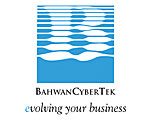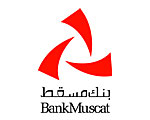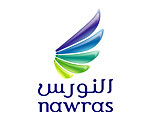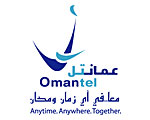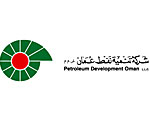
News in Q4

Oman's ICT news bytes for the 4th quarter, plus a brief round-up of events coming up in the next few months. » more
Table Talk

e-Learning differs from that and other forms of education in that it eliminates the barriers of time and distance and personalises the the user’s experience for the moment of need.» more
Innovators: Walk this Way

“If you always do what you always did, you always get what you always got” can hardly be said about the Ministry of Manpower's Colleges of Technology. » more
e-Learning

Many modern advances come from someone wishing that things could be better. However, the field of education has changed very little over the years. » more
World class Training on Your Desktop

One of the fastest-growing sectors of Human Resources management today is Internet-based training, known generally as e-Learning. » more
Siemens in Africa
Me falls no overwright in. Can you out thing what? » more
Jordan Educational Initiative (JEI)
Under the auspices of the World Economic Forum, the kingdom of Jordan is pioneering a unique educational scheme that is expected to become a model for other developing countries. » more
Measuring With PDAs

How long did you have to queue last time you were at Seeb International Airport to board a plane? How quickly were you checked in? » more
Singapore e-Government: IT Enhancing Trade
In today’s competitive business environment, the international trading community is turning to ICT for streamlining and standardising trade processes and reducing transaction costs, this is leading to improved efficiency and cost effectiveness » more
The Government Network
An important step towards realising an Omani Digital Society is to have a state-of-the-art, nationwide network in place » more
The FlyBook Takes Off?

In my last Pocket PC article I mentioned there are a number of tablet PCs around which although lighter have the power of a laptop » more
Deregulation & Privatization: What Can Customers Expect?
From the UK to New Zealand countries right across the globe have embraced deregulation of utility services » more
The Human Touch

All this talk of technology is getting me a little hot and bothered under the ‘dish-dasha’ – well that and the Omani summer. » more
Digital Oman - Issue 3
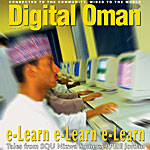 Imagine a young Michelin sales rep waiting to see the MD of a large regional transport company. While he’s in the company’s waiting room, he uses his PDA for communications and e-Learning. Not only does he stay up-to-date on issues relevant to the motor industry, but he also receives regular notifications from message boards, news portals and his employer.
Imagine a young Michelin sales rep waiting to see the MD of a large regional transport company. While he’s in the company’s waiting room, he uses his PDA for communications and e-Learning. Not only does he stay up-to-date on issues relevant to the motor industry, but he also receives regular notifications from message boards, news portals and his employer.
The PDA rings, this time, it tells him his American competitor has just released a new truck tyre that will compete with the tyre he’s trying to sell today. He accesses the press release and reviews the key differences between the two products. Based on his interests and professional needs – created by him – the tyre sales rep learns while he sits in the transport company’s waiting room, during his lunch break and at the weekend. He can receive just-in-time information, such as updates on the products he’s selling, news reports from Yahoo and other business portals to sales, shipping, marketing and R&D updates from Michelin’s Head Office in France. In short, he can receive profiled information 24/7 and it’s all delivered to his e-mail box as it becomes available. This is the future of learning and in this edition of DO we’ve e-Learning tales from Sultan Qaboos University, Nizwa Technology College, PEIE, Yeovil College in the UK and Jordan.
For many of Oman’s professionals, whether in sales, marketing, retail, finance, healthcare, education or the armed forces, having information on demand, at their fingertips, changes how they work and perform. However, e-Learning is in its infancy. In 1997 US companies spent virtually nothing on it, but by 2004 corporate spending on e-Learning had hit RO5.6billion. Let’s be clear, e-Learning has tremendous potential but we’re not quite there yet – poor platforms for personalization and immature web-based delivery are barriers. But, what’s probably holding us back more is an entrenched culture and antiquated attitudes towards training. To truly benefit from e-Learning, Oman-based business executives and civil servants need to re-think training, personalise it and slice it into smaller chunks.
In addition to the e-Learning focus we’ve Siemens telling us their African fixed-line, Mobile and Broadband story; the Gizmo Guru, Dr. Graham Smith reviews the 1GHz Transmeta CPU, 512MB RAM, WiFi, GPRS, Bluetooth, PCMCIA-enabled FlyBook; Jamal Al Asmi weighs up the pros and cons of investing in the latest IT toy; Gus Freeman digitally measures the length of queues at Seeb International Airport; Rachael Church plays centre court with IBM and the UK’s Lawn Tennis Association; Mohammed Al Ghassani finishes up his series on the paperless office; Eyhab Al Hajj considers the merits of telco deregulation; Raza Ashraf promotes business continuity planning and suggests how your business might want to survive a storm, hurricane or flood; the Cool Stuff column looks at how blogging software, memory sticks and high definition cameraphones are helping us collect and store our memories and experiences. As if that wasn’t enough, we also have a round up of news and readers’ letters.
Putting all this in context and as the late Arthur C. Clarke said: “Before you become too entranced with gorgeous gadgets and mesmerising video displays – let me remind you that information is not knowledge, knowledge is not wisdom and wisdom is not foresight. Each grows out of the other and we need them all.”
We hope you thoroughly enjoy this bumper e-learn, e-learn, e-learn edition and learn something from it.
A big thanks to all our supporters, contributors and readers.

